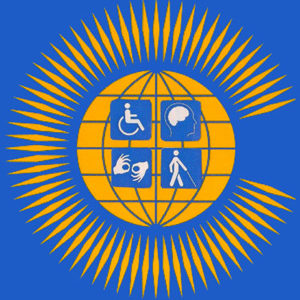This Special General Meeting of the Commonwealth Disabled People’s Forum calls on the US President to withdraw a highly damaging policy to disabled people in USA and world wide, which is likely to end decades of progress of advancing the rights and inclusion of disabled people [people with disabilities].
Trump when launching the policy of the Federal Office of Management and Budget on 27th January 2025, stated:
“We are rooting out waste. We are blocking woke programmes and exposing activities that run counter to the national interest.”
This led to an immediate freeze on services and payments to over 70 million US citizens with disabilities and a dramatic impact on the Foreign Assistance budget of $60 billion dollars with a 90 day freeze. Only a tiny fraction of this through USAID goes directly to disability projects ($30 million in 2023), a much larger part goes through the State Department to disability friendly projects. All is now stopped with an uncertain future. Laws will in time replace current ones to make it much harder to challenge legally.
The freeze has been several times struck down by federal judges as unlawful.(e.g. 4th February) However, the measures clearly represent a clear and present danger to disabled people across the US and in the 130 countries that receive aid from the State Department (State Department guidance on Inclusion of Disability in Foreign Aid) and USAID Disability Policy is now taken down from website and all projects worldwide are frozen Hundreds of Disability Projects have been frozen in Commonwealth countries, for example Inclusion Development Partners which support Inclusive Education in Jamaica, Bangladesh, Lesotho, Malawi, Nigeria, Rwanda, Sierre Leone and Tanzania.
While it is true the USA is one of very few countries not to ratify the UNCRPD, successive Presidents and Governments including Trump (1st term) have supported the principle of equality for persons with disabilities.
As was clearly demonstrated when Trump attacked equal employment policies of hiring disabled air traffic controllers, without any proof as the cause of the Washington DC airport crash killing 67 people Washington Post 2nd February. Trump is quoted as saying previously that he is of the view disabled people should just die.
CDPF therefore calls on all Governments and especially other donor countries to:
a) Put pressure on US Government to permanently withdraw the blanket budget cuts to USAID, especially disability aid projects through all forums including the United Nations
b) In the event of no restoration to pool together their resources to make up the shortfall
c) To make clear supporting disabled people to gain equality and challenge discriminatory practices is not a fashion or ’woke’, but a fundamental human rights issue.
d) Though many doner country projects still give money to intermediaries rather than organisations run and led by disabled people and do not employ sufficient disabled people, this is an argument to reform these aid systems rather than stopping them.
Appendix: USAID Disability Policy
“Goal: This Disability Policy seeks to empower and elevate the lives of persons with disabilities in partner countries by helping USAID and our partners recognize, respect, value, meaningfully engage, include, and be intentional in supporting persons with disabilities and their representative organizations to benefit equitably from our work as equal partners.
Objectives: In support of this goal, USAID will work toward the following six objectives.
- Foster disability inclusion and respect for disability rights across Agency programming in development, humanitarian, and peacebuilding assistance.
- Respect, empower, and meaningfully engage persons with disabilities—and their representative organizations—across their life course as drivers of development and peace, agents of change, and essential partners in the generation of solutions.
- Identify and dismantle discrimination and barriers to foster accessible, equitable, safe, and inclusive societies in which persons with disabilities and their representative organizations can advocate for and exercise their rights without fear of violence or pressure to assimilate.
- Recognize, respect, and meaningfully engage and partner with the full diversity of persons with disabilities.
- Advance the knowledge base of effective programming by strengthening disability-inclusive data collection, research, analysis, and learning associated with USAID programming, including with respect to assessing the quality of programming and representation of persons with disabilities.
- Leverage USAID’s leadership and convening power in fostering political will among international, regional, national, and local institutions to implement disability-inclusive principles and practices as well as accountability to persons with disabilities and their representative organizations.”
Source: USAID Disability Policy
